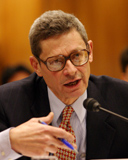World Politics Review | Trump's Trade Threats Have Pushed Mexico and China Closer Together
/With talks to renegotiate NAFTA deadlocked this week over the hard-line positions of the Trump administration, Mexico was again left pondering the fate of its biggest trade relationship. Negotiations over the trade deal will now extend into next year, heightening both the economic uncertainty and Mexico’s desire to branch out, as countries like China look to expand their stake in the Mexican economy. In an email interview, Carin Zissis, editor-in-chief of AS/COA Online, the website of the Americas Society/Council of the Americas, discusses the evolving nature of Mexico’s ties with China, how a change in NAFTA could affect them, and why Mexico is looking to wean itself off the U.S. market.
WPR: What is the nature of Mexico and China’s political and trade relations, and how have they changed in recent years? What impact has the Trump presidency had?
Carin Zissis: Looking back at the recent history of China-Mexico ties, the two countries have been rivals—particularly when it comes to trade. In 2001, when China sought the unanimous vote to gain accession to the World Trade Organization, or WTO, Mexico was Beijing’s last obstacle. In September of that year, China and Mexico worked out a bilateral deal that paved the way for Beijing to win its WTO membership, but also allowed Mexico a six-year grace period, later extended to 2011, to maintain countervailing duties on hundreds of Chinese products.
A major reason for Mexico’s hesitation about China joining the WTO came down to the fact that the two countries compete as exporters. There is evidence that Mexican concerns were well-founded. In the 16 years since it joined the WTO, China has replaced Mexico as America’s second-largest trading partner. At the same time, Mexico developed a gaping trade deficitwith China to the tune of about $65 billion in 2015, while receiving a fraction of its total foreign direct investment from the Asian powerhouse.
But now they share something in common: Both are being attacked by the Trump administration over trade deficits and as part of Donald Trump’s “America First” policy. Still, well before Trump began repeatedly hurling abuse at the southern neighbor, Mexico was already showing interest in boosting ties with China....
Read the full text of the article at World Politics Review or via AS/COA Online.
Read More



